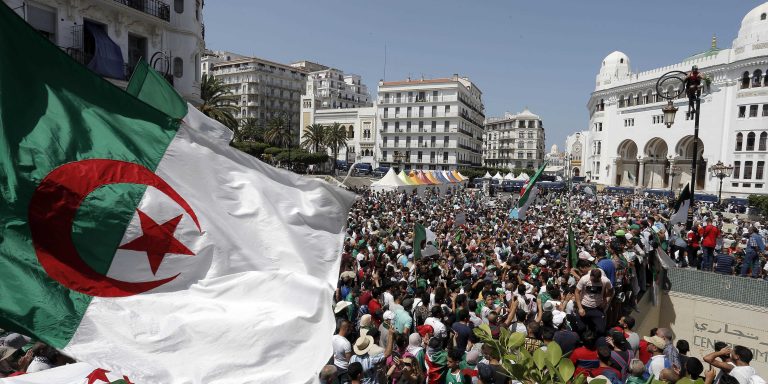INTELBRIEF
August 2, 2019
IntelBrief: Comparing Algeria and Sudan’s Popular Revolutions

- Against all odds, the popular revolts in Sudan and Algeria both succeeded in forcing the removal of their long-time autocratic leaders.
- Protesters in both countries are now grappling with how to change entrenched power structures that allow elites connected to the regime to retain power.
- The Sudanese military has shown little restraint as protests continue there.
- In Algeria, the relative absence of violence has led analysts to be hopeful that real and enduring change there remains possible.
.
Against all odds, the popular revolts in Sudan and Algeria both succeeded in forcing the removal of their long-time autocratic leaders. Sudanese president Omar al-Bashir and Algerian president Abdelaziz Bouteflika both left office in April following massive and sustained popular protests that spread throughout each nation. Protesters in both countries are now arguably grappling with an even more difficult problem, which is how to change entrenched power structures that allow elites connected to the regime to retain power.
In Algeria, the military has not violently repressed the protests to date. In fact, there have been no deaths attributed to the protests. The military has refused to relinquish power or step down and is attempting to minimize the voice of the opposition but has resisted a more blatant and forceful attempt to consolidate control. There is still a possibility that the Algerian military will mimic the actions of other militaries in the region that responded to revolution and popular protest with a move toward authoritarianism. Egyptian dictator Mubarak was forced out of office only to be replaced, after a coup, by Abdel Fattah al-Sisi, who has managed to consolidate his grip on power while marginalizing civil society and any meaningful political opposition. In Syria, with the help of Russia and Iran, dictator Bashar al-Assad and the Syrian military have brutalized civilians in the eight-year long civil war. But for now, Algeria’s revolution has been peaceful, and therefore noteworthy in a region where restraint has been rare and oppression ubiquitous.
There has been no such restraint shown by the Sudanese military as protests continue there. On July 29, five people, including 4 students, were shot and killed by Sudanese military personnel in the town of al-Obeid. The protesters were in the streets expressing outrage over fuel and bread prices: the initial grievances that catalyzed the protests that ended up toppling al-Bashir. The government is now being run by a ‘Transitional Military Council’ (TMC) and talks spearheaded by the African Union are underway to form a new council with civilian and military representation. The protesters have been massed outside TMC headquarters in Khartoum since May, demanding the end of military rule, even if it is, as it claims to be, ‘transitional,’ asking for a purely civilian government. Initially, elements of the Sudanese military, including paramilitary units such as the Rapid Support Forces (RSF) led by Mohamed Hamdan Dagalo aka Hemeti, refused al-Bashir’s orders to move against the civilian protesters. This led to al-Bashir leaving office to await trial, but once it became clear that the removal of al-Bashir would not be enough to assuage the protesters, the RSF violently attacked demonstrators. The RSF has powerful foreign backers in Saudi Arabia and the United Arab Emirates, each with a vested interest in seeing an end to popular and democratic protests.
On June 3, RSF members massacred an estimated 127 people in a protester camp outside the TMC headquarters. Negotiations were supposed to resume on July 30 over forming a new governing body of 6 civilians and 5 senior military officers who would then form the larger civilian transitional government that would be in place for 39 months. Just this week, Sudan suspended school for all students after children took to the streets to protest and some were killed. It is unclear if the recent violence will impact these talks. While there are clear similarities between the revolutions in Algeria and Sudan, there are also important differences. The relative absence of violence in the former has led analysts to be hopeful that real and enduring change in Algeria remains possible. Neither the protesters or the military in Algeria have backed down, and a stalemate, albeit peaceful, persists. But this stalemate will not hold forever, highlighting the importance of progress on viable next steps to transition to a political solution in Algeria that will be palatable to both sides. An interim political deal could buy more time so that the contours of a sustainable power-sharing agreement could be forged, leading to real and sustainable change in the heart of the North Africa.
.
For tailored research and analysis, please contact: info@thesoufancenter.org
[video width="960" height="540" mp4="https://thesoufancenter.org/wp-content/uploads/2019/08/IB-0802.mp4" poster="https://thesoufancenter.org/wp-content/uploads/2019/08/AP_19207592496646.jpg"][/video]